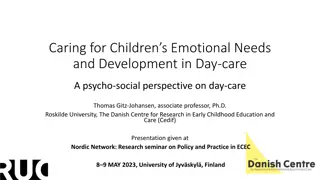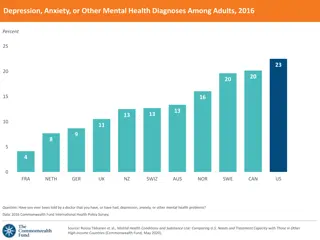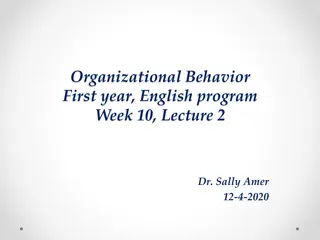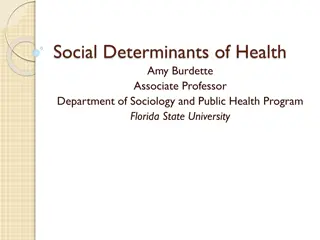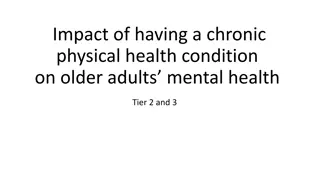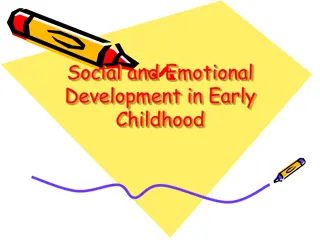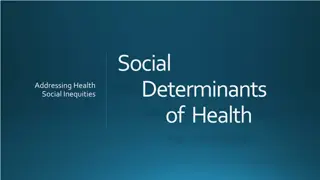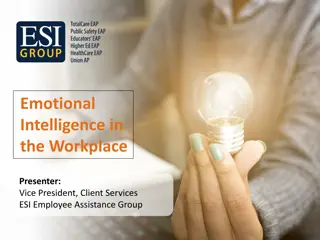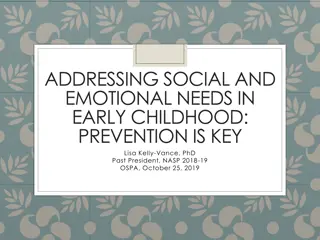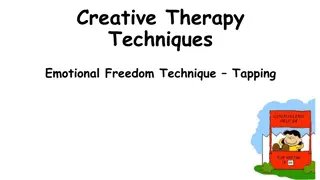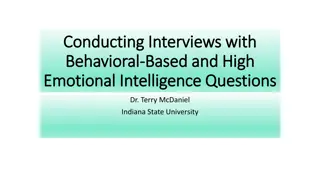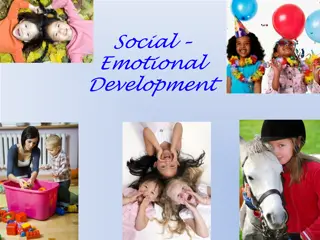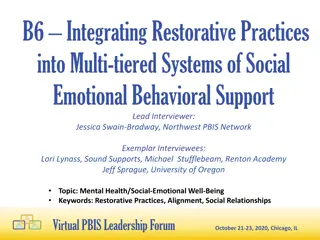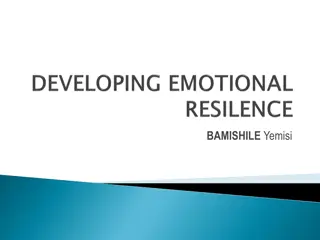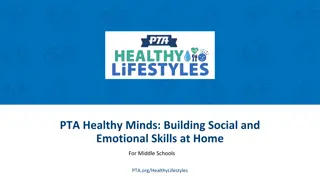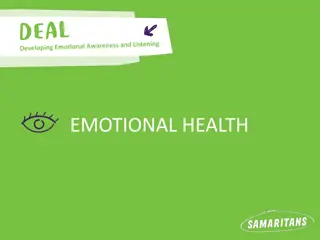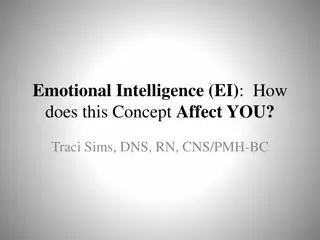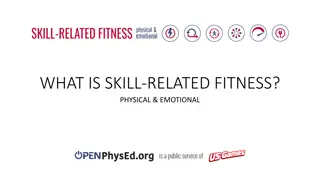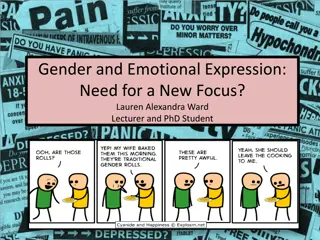Strategies for Improving Emotional Wellness and Health
Emotional wellness involves identifying, expressing, and managing a range of feelings. Strategies to enhance emotional health include staying positive, reducing stress, getting quality sleep, exercising, strengthening social connections, viewing mistakes as learning experiences, practicing mindfulne
1 views • 13 slides
Understanding Emotional Patterns in Families
Families play a crucial role in shaping individuals' emotional responses and behaviors. Caregivers influence how we perceive and manage emotions, impacting our emotional well-being. By examining how different emotions are accepted, rejected, and modeled within families, one can gain insights into th
10 views • 14 slides
Understanding the Health Triangle for Overall Well-being
The Health Triangle emphasizes the importance of maintaining physical, mental/emotional, and social health for overall well-being. It provides guidelines and prompts for self-assessment in each aspect of health. By evaluating factors such as sleep, diet, emotional well-being, and social relationship
5 views • 25 slides
Understanding Children's Emotional Development in Daycare from a Psycho-Social Perspective
Scientific evidence emphasizes the early onset of emotional development and its profound impact on lifelong outcomes. The quality of childcare processes plays a pivotal role in shaping children's social-emotional development, highlighting the importance of nurturing emotional relationships in daycar
0 views • 10 slides
Mental Health Insights Among High-Income Countries Adults in 2016
Explore the prevalence of depression, anxiety, emotional distress, and socioeconomic needs among adults in high-income countries based on the 2016 Commonwealth Fund International Health Policy Survey. The data highlights the rates of mental health diagnoses, subjective experiences of emotional distr
1 views • 10 slides
Understanding Emotional Labor in Organizational Behavior
Emotional labor involves employees expressing organizationally desired emotions during work interactions, impacting job performance. Employees may face emotional dissonance when projecting one emotion while feeling another, leading to surface or deep acting. Affective Events Theory (AET) suggests th
0 views • 19 slides
Understanding Emotional Wellness for Inner Well-Being
Exploring the importance of emotional wellness in cultivating inner well-being, this content delves into the facets of social, mental, and emotional well-being. It emphasizes the significance of acknowledging and accepting our feelings, maintaining a positive outlook, and finding purpose and peace w
2 views • 27 slides
Understanding Social Determinants of Health
Chronic conditions like heart disease and cancer have multiple causes, not all biological. Social epidemiology studies the social distribution of health, morbidity, and mortality risk influenced by social status and conditions. Factors such as age, gender, race, socioeconomic status, and social cond
0 views • 32 slides
Impact of Chronic Physical Health Conditions on Older Adults' Mental Health
Having a chronic physical health condition can significantly impact an older adult's mental health, leading to vulnerabilities, fear, loss of identity, and emotional struggles like low self-esteem and confidence. The emotional toll of chronic conditions affects overall health outcomes and quality of
5 views • 20 slides
Early Childhood Social and Emotional Development Insights
Social and emotional development in early childhood is influenced by various factors such as family dynamics, parenting styles, peer interactions, and cultural backgrounds. Erikson's stages highlight the importance of initiatives and self-understanding in shaping emotional growth. Parents play a cru
2 views • 35 slides
Understanding Social Determinants of Health and Their Impact on Well-being
Social determinants of health encompass a wide range of factors, including income, education, employment, and genetics, that significantly influence individual and population health outcomes. Research highlights the importance of addressing these determinants to improve health and reduce disparities
4 views • 30 slides
Comprehensive Overview of Health and Wellness Principles
The importance of physical protection, disease prevention, and health education is emphasized in maintaining overall well-being. Physical activities, proper nutrition, hygiene, and mental well-being all play crucial roles in achieving a balanced state of health. This holistic approach to health also
2 views • 34 slides
Understanding Medical Social Work and Its Impact on Patient Well-being
Medical Social Work, also known as Health Care Social Work, plays a crucial role in addressing the social, physical, and psychological needs of patients. Through providing case work, after-care, and convalescence services, Medical Social Workers contribute to reducing hospital readmissions, preventi
0 views • 12 slides
Understanding Emotional Intelligence in the Workplace
Explore the significance of emotional intelligence in the workplace, its definition, five competencies, case studies, and strategies to enhance skills. Dive into scenarios, role-plays, misconceptions, and why emotional intelligence is crucial for professional success. Learn about managing emotions,
0 views • 33 slides
Understanding Emotional Intelligence: Key Principles and Skills
Emotional intelligence, as presented by David Taylor, is crucial in perceiving, understanding, and managing emotions in oneself and others. It plays a vital role in professional and personal relationships by enhancing emotional awareness, recognition, and management. The principles of emotional inte
2 views • 22 slides
Understanding Social and Emotional Needs in Early Childhood
The early years from birth to age 8 are crucial for developing intellectual, social, and emotional skills that set the foundation for success in school and life. Educating parents about children's emotional capabilities, supporting caregivers, and intervening early can significantly impact children'
1 views • 31 slides
Understanding the Impact of Cortisol on Emotional Expression in Young Children Facing Economic Hardship
This study explores how the stress hormone cortisol is related to emotional expression in young children experiencing economic hardship. Cortisol levels can indicate stress, but prolonged exposure to stress can lead to desensitization. The research focuses on children attending Head Start preschools
0 views • 15 slides
Understanding Emotional Abuse: Signs, Effects, and How to Respond
Explore the intricacies of emotional abuse through the eyes of Dr. Katia Reinert, Associate Director of GCHM. Delve into the techniques used by emotional abusers, self-assessment for identifying abuse, effects of abuse, and guidance on how the Christian community can help. Discover the challenges of
1 views • 31 slides
Understanding Emotional Freedom Technique (EFT) Tapping for Emotional Wellness
Emotional Freedom Technique (EFT) tapping, rooted in acupressure, offers a holistic approach to addressing stress, fear, and phobias. This body-centered therapy draws on ancient Chinese practices, stimulating specific acupoints to improve energy flow. Studies show effectiveness in treating depressio
0 views • 4 slides
Understanding the Three Dimensions of Health: Physical, Emotional, and Social
Explore the different facets of health through the Health Triangle model, which includes physical, emotional, and social well-being. Learn how each aspect contributes to overall wellness and discover elements of physical and mental/emotional health that are essential for a balanced lifestyle.
0 views • 26 slides
Enhancing Emotional Intelligence Through Behavioral Interview Questions
Explore the key aspects of emotional intelligence, including social-emotional competencies and cognitive, affective, and behavioral competencies. Learn how to conduct interviews focused on emotional intelligence and discover the importance of relationships, self-awareness, responsible decision-makin
0 views • 44 slides
Understanding Social and Emotional Development in Young Children
Explore the general emotional patterns and specific emotions in young children aged 4 to 6 years. Understand the positive and negative characteristics such as self-centeredness, independence, anxiety, and fear, and learn how to deal with common fears like imaginary dangers and separation anxiety. Re
1 views • 19 slides
Safeguarding Infants from Emotional Maltreatment: What Works?
Safeguarding infants from emotional maltreatment is crucial during the first two years of life. Emotional abuse, though not always accompanied by physical or sexual abuse, can have severe impacts on a child's development. The paper explores the structure, prevalence, and impact of emotional abuse on
3 views • 59 slides
Understanding Social Neuroscience: Exploring Human Sociality and Well-Being
Social neuroscience delves into how the brain processes social interactions and their impact on human well-being. It focuses on the interconnectedness between social connections and overall life satisfaction, suggesting that humans are inherently social beings with a strong need for social belonging
3 views • 21 slides
Social Entrepreneurship and Social Inclusion in Bulgaria
The development and implementation of social entrepreneurship practices in Bulgaria aim to promote social inclusion through the development of the social economy. The focus is on combining economic results with social objectives, managed transparently with measurable, positive financial value. Vario
2 views • 12 slides
Integrating Restorative Practices into Multi-tiered Systems of Social Emotional Behavioral Support
Explore the integration of restorative practices into multi-tiered systems of social emotional behavioral support in the context of mental health and social-emotional well-being. Gain insights from experts on aligning restorative practices, fostering social relationships, and enhancing virtual PBIS
0 views • 37 slides
Understanding Emotional Intelligence and its Components
Emotional Intelligence is about identifying, understanding, and managing emotions, recognizing your own needs and those of others, and enhancing interpersonal skills. It involves self-perception, self-expression, and affects decision-making and stress management. People with high emotional intellige
0 views • 20 slides
Understanding Adolescent Development and Emotional Intelligence by Finbar Chambers
This collection presents insights on Gardner's Multiple Intelligences, Emotional Intelligence, and the importance of understanding adolescent development. Finbar Chambers explores emotional makeup, behavior management strategies, and the transition to independence during adolescence. Discover the im
0 views • 20 slides
Understanding Emotional Labour in Probation Practice
Explore the concept of emotional labour in probation practice, highlighting the management of emotions, impact on research and practice, links to burnout, and the role of managerialism and rationality. Delve into emotional work, Chamberlayne's 'emotion work', and feeling rules associated with emotio
0 views • 16 slides
Importance of Emotional Intelligence in Religious Leadership
Religious leaders benefit greatly from high emotional intelligence, leading to better performance, increased staff retention, and a more positive work environment. Emotional intelligence plays a vital role in pastoral ministry, enhancing emotional care for congregants. Educational programs focusing
1 views • 15 slides
Understanding Emotional Intelligence in the Workplace
Emotional intelligence plays a crucial role in professional success, impacting how we lead teams, handle pressure, and build relationships. This webinar explores the definition of emotional intelligence, its significance in the workplace, and practical ways to enhance it. Discover the key elements o
0 views • 14 slides
Understanding Emotional Intelligence: Definition, Importance, and Examples
Emotional intelligence, a term that originated in the 1960s, refers to the ability to recognize and manage emotions in oneself and others effectively. It involves identifying emotions, understanding their impact, and using this awareness to guide behavior. Emotional intelligence is crucial for perso
1 views • 35 slides
Enhancing Emotional Resilience: Key Strategies and Benefits
Exploring the concept of emotional resilience, this content covers the definition of emotions, emotional resilience, and the domains of resilience. It delves into the importance of emotional resilience, ways to improve it, and how it helps individuals bounce back from adversity, maintain balance, an
0 views • 17 slides
Exploring Social and Emotional Learning for Families
Understanding the importance of social and emotional learning in family life, this resource provides insights on developing key skills, fostering growth, and creating a supportive community. Discover what SEL is, its benefits, and dispelling common misconceptions. Explore learning agreements, sessio
0 views • 28 slides
Exploring the Ups and Downs of Emotional Health Throughout the Day
Dive into a visual journey depicting the ebb and flow of emotional well-being in a day, from morning reflections to evening introspections. Experience different facets of emotional health through images, timelines, and audio clips, offering insights to nurture your mental and emotional well-being.
0 views • 7 slides
The Impact of Emotional Intelligence in Nursing Practice
Emotional intelligence plays a crucial role in nursing, influencing personal well-being, patient outcomes, and stress management. Nurses with higher emotional skills are better equipped to navigate the challenges of their profession. Understanding the history and significance of emotional intelligen
0 views • 23 slides
Performance Development: Emotional Factors and Strategies
Understanding emotional factors in performance development, collecting relevant information, utilizing positive self-talk for emotional development, and the importance of monitoring and evaluating performance for continual improvement and targeted training. Visual aids complement the explanation of
0 views • 4 slides
Social-Emotional Health and Resilience of Teachers in East European Countries
This study explores the social-emotional health and resilience of teachers in Latvia, Lithuania, and the Slovak Republic as part of an Erasmus+ project aimed at developing a digital support system to promote their well-being. The interplay between mental health, social-emotional health, and resilien
0 views • 30 slides
Understanding Skill-Related Fitness: Physical and Emotional Aspects
Skill-related fitness encompasses both physical and emotional components, such as agility, balance, coordination, power, reaction time, and speed. Physical agility involves quick body movements, while emotional agility relates to positive responses in various situations. Physical balance requires we
0 views • 7 slides
Gender and Emotional Expression: A New Perspective on Identity and Mental Health
Exploring the societal constructs of gender and their impact on emotional expression, this study delves into the Gender Roles Hypothesis, challenges traditional norms around emotional display, and examines the correlations between gender and mental health outcomes. The research sheds light on the ne
0 views • 15 slides



